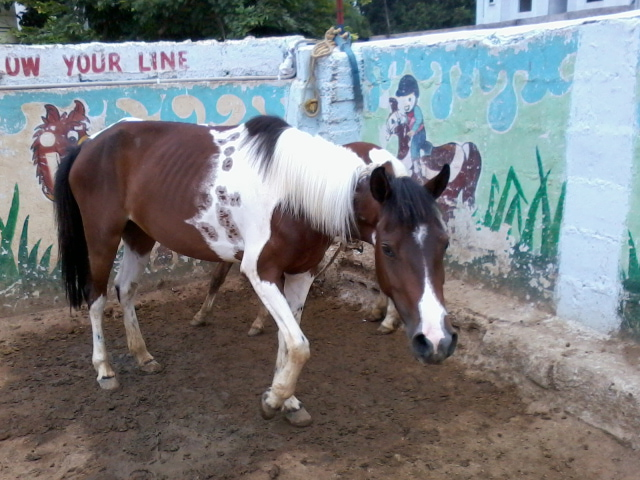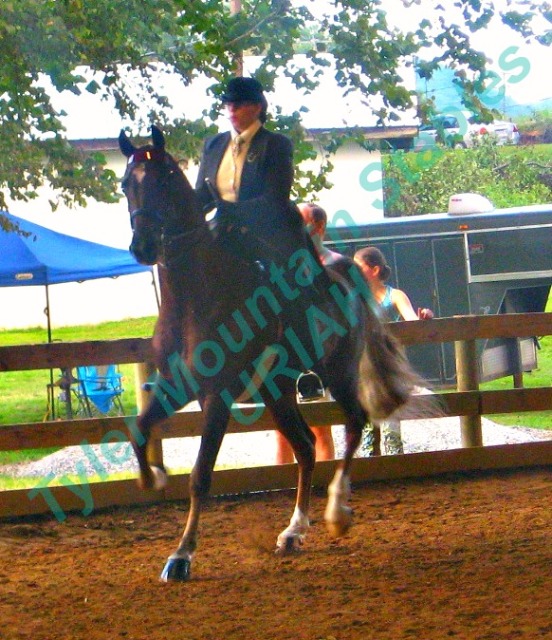QuestionI have a 12 week old Dutch warmblood orphan who was breach at birth and a dummy foal but recovered very well. His legs have straighten sense his birth but he is intermitantly lame still. He has seen a couple veterinarians and has had many different feed instructions. I'm kind of confused as to what he should be eating. he is currently weaned of all milk replacer and is eating milk replacer pellets about as much as he wants which is around 6-9 pounds. He is also geting about a pound of equine jr which the doctor told us to start at 3 months. He gets hay but doesn't eat much of it. We have been told he is huge and we don't want him to develop any joint problems.
thanks
Jamie
AnswerHi Jamie,
Warmbloods present a bit of a different scenario than ordinary foals because they are so much bigger. Since your baby is 12 weeks, I'd gradually start cutting him back on the milk replacer pellets because those can put too much weight on him too quickly, and that can create joint problems. It's probably not a good idea to let him eat these freely. Check the recommendations on the bag for the amount to feed, and stick with it.
Your vet's instructions are good - equine jr. is a good, all-around feed and a pound a day is adequate for now. Another good feed like this is Mare & foal - Stateline tack sells a John Lyons brand of Mare & Foal that's well balanced and inexpensive. (Incidentally, measuring with a measuring cup is more accurate than estimating the amount you're feeding in lbs. since different feeds have different weights.) At about 5 or 6 months, you'll probably want to increase that so that you're giving about 3 cups a day.
The quality of the hay he's getting is important. Free-feeding grass hay would be the best for him to encourage him to eat hay. If possible, at this stage, grass hay preferable for him at least once a day, with a little alfalfa (about 1/4 flake) once a day. Be extremely careful not to feed too much alfalfa because it can cause epiphysitis in larger babies. Make sure he's getting plenty of free time in turn-out to exercise and run and play. That's the way their bodies help to balance out the nutrition they're getting - through exercise to burn off calories they don't need.
Another type of feed to consider is beet pulp. I've had extremely good results with it. If you're not familiar with it, it's what's left of the sugar beets they shred and squeeze the sugar juice out of, and it's full of minerals, vitamins and calcium for horses. It burns nice and slow, without making them hot or hyper. It comes dehydrated in 50-lb sacks, and costs about $12 for a sack. Make sure you soak it in water for about 1/2 hour before feeding it (completely cover the dehydrated beet with water). Your baby probably only needs about 2 cups of it per day (I feed it in the evenings) and you can mix it with the equine jr. It's got a slightly sweet taste to it, and they love it.
I know it's confusing when you're getting such different information from many different sources. Find a good feeding routine for your little guy and stick with it. By 5-6 months, he should be off the milk replacer pellets altogether and on mostly hay with some supplements (like equine jr. or Mare & Foal) and something like beet pulp. That's a pretty good, balanced diet for him. Watch his weight and look at his ribcage and hip bones as your guide. You should be able to feel ribs beneath a thin layer of skin and fat, and hip bones should be rounded, not sharp-looking. That's a healthy weight. Don't hesitate to adjust the feed - a little more or less of supplements - depending on his body condition.
Hope this helps. Don't hesitate to write back if you have any other questions. Good luck with your baby!
--Susan

 ponies breed
Question
ponies
hello Dorothy. may i know which
ponies breed
Question
ponies
hello Dorothy. may i know which
 Kaves Ankle Injury
QuestionQUESTION: Hi Anne,
Yes I did hear back from Dr
Kaves Ankle Injury
QuestionQUESTION: Hi Anne,
Yes I did hear back from Dr
 Double bridle prob.
Question
Uriah and Hope
I have a saddlebred and
Double bridle prob.
Question
Uriah and Hope
I have a saddlebred and
 lunge lines made out of cotton
Question
lunge line cotton lead rope
Hi L
lunge lines made out of cotton
Question
lunge line cotton lead rope
Hi L
 bleeding hooves - Rick Gore Horsemanship
Question
hooves
hi rick! I have attached a photo so you
bleeding hooves - Rick Gore Horsemanship
Question
hooves
hi rick! I have attached a photo so you